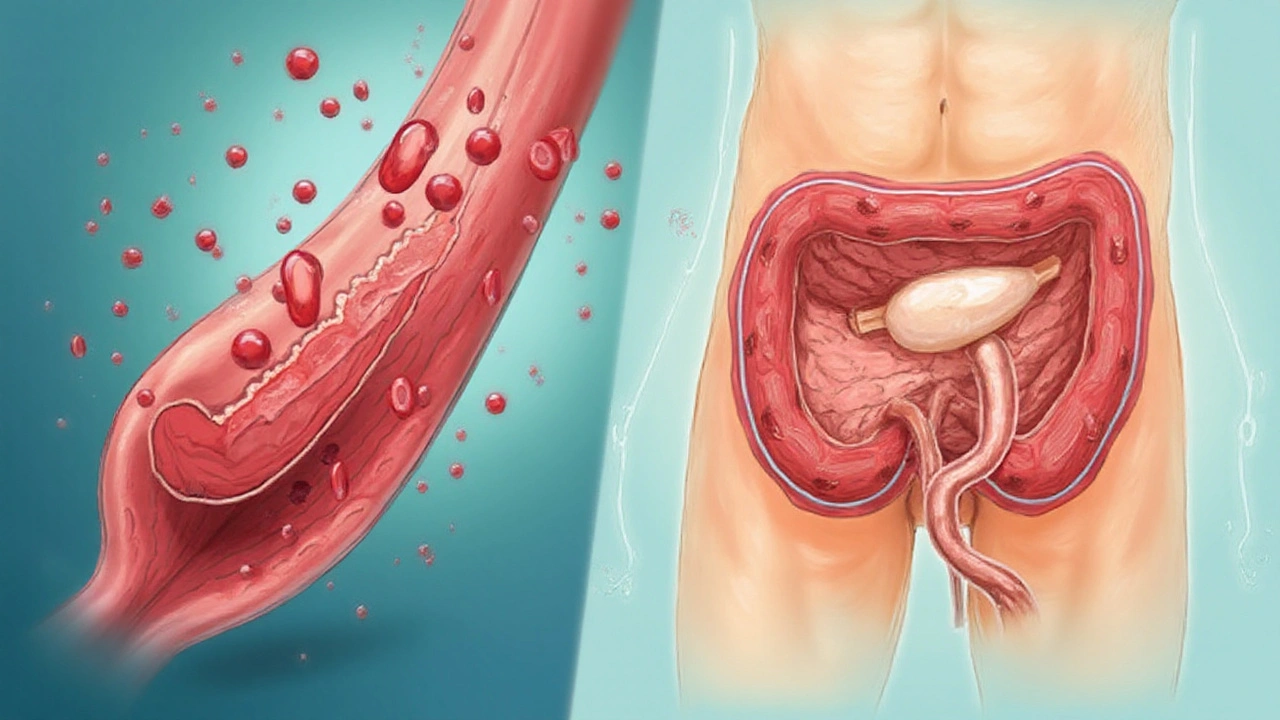If someone told you there’s a single pill that could help you pee easier at night and lower your blood pressure, you might think it sounds too convenient to be true. But that’s what Hytrin (you might spot it by its generic name: terazosin) actually does. Somehow, though, it often flies under the radar and doesn’t get as much attention as the blockbuster drugs out there. If you’ve just been handed a prescription for Hytrin, or someone close to you has, you probably have a mix of questions and maybe a touch of worry. Let’s break down exactly what this drug is, why doctors reach for it, and what it actually means to add it to your daily routine.
How Hytrin Works: More Than Just Lowering Blood Pressure
Hytrin isn’t one of those new arrivals in the medicine cabinet. It’s been treating high blood pressure and symptoms of benign prostatic hyperplasia (yep, that’s BPH—a fancy way to say an enlarged prostate) since its approval by the FDA in the 1980s. So what gives this little tablet its double-duty powers? It's an alpha-1 blocker, which means it relaxes specific muscles in your blood vessels and prostate. This, in turn, lets blood flow more smoothly and helps you empty your bladder with less effort.
Most doctors start people on a low dose to ease the body into it, since dropping your blood pressure too quickly can make you feel woozy (especially when standing up fast). Taking it at bedtime is a classic tip—most folks feel less dizzy that way. For prostate issues, Hytrin can relieve that annoying stop-start flow and the midnight bathroom trips. One real-world study showed that men taking terazosin had significantly fewer times getting up at night (down from around three to just once). That’s a sleep upgrade no one complains about.
There’s some fun science history here, too. Researchers looking for high blood pressure fixes stumbled into the side effect of easier urination, and soon urologists jumped on board. Now, it’s a front-row player for guys in their 50s and 60s dealing with both rising blood pressure and prostate headaches.
If you’re wondering about numbers: Hytrin typically lowers systolic blood pressure (that’s the top number) by around 10-15 points and diastolic (the bottom) by 6-8 points, on average. Not everyone will see these exact results—it depends on your biology and whether you’re taking other meds.
Another angle? Hytrin’s not a "water pill" (diuretic), and it won’t mess with your blood sugar the way some blood pressure drugs might. That’s often a win for people with diabetes or on complicated medication cocktails.
And if your wallet is tired of expensive pharmacy trips, here’s a perk: terazosin is generic, so it’s one of the more affordable choices if your insurance prefers to pinch pennies. Plus, it’s available in a range of doses, from 1 mg up to 10 mg. Flexibility makes it simple to dial in the right amount.
Let’s not gloss over the fact that Hytrin isn’t typically a first-line treatment for just high blood pressure these days (guidelines have shifted toward ACE inhibitors, ARBs, and calcium channel blockers). But if someone needs help for both hypertension and prostate symptoms—or can’t tolerate those other options—terazosin steps in as a solid multitasker.
| Use | Typical Starting Dose | Common Range | When to Take |
|---|---|---|---|
| High Blood Pressure | 1 mg at bedtime | 1 to 5 mg daily | Bedtime |
| Benign Prostatic Hyperplasia (BPH) | 1 mg at bedtime | 5 to 10 mg daily | Bedtime |
Having the timing in check helps avoid feeling dizzy or faint. If someone doesn’t tolerate the evening dose (for example, if they work night shifts or feel groggy driving to work in the morning), their doctor can adjust the timing. It’s flexible, much like the people taking it.

Common Side Effects and How to Manage Them
Every medicine’s got a catch, and Hytrin is no exception. The most common problem? That lowered blood pressure can swing a bit too low—especially when standing up too fast. Doctors call this "orthostatic hypotension," but to you, it might feel like an elevator drop, wobbliness, or blurred vision if you jump out of bed. If you’re new to Hytrin, standing up slowly actually matters.
Some people get headaches, stuffy noses, or notice swelling in their ankles after a few days. While that might sound like a random mix, it’s all due to the way alpha-blockers change how your blood vessels handle pressure and fluid. Here’s a quick hacking-the-side-effects cheat sheet:
- Take Hytrin at bedtime to «sleep through» the lightheadedness.
- Try the "roll to the side and push up slowly" morning routine instead of hopping up.
- If you feel faint, sit or lie down right away—especially in the first week.
- Drink water; dehydration makes the dizziness way worse.
- Skip the alcohol, especially when starting out—booze + lower blood pressure is a recipe for being that guy who passes out at the barbecue.
Other, less common side effects include palpitations, fatigue, swelling in the legs, and abdominal discomfort. Some men notice reduced semen volume during ejaculation (that one's listed in the paperwork, but it’s usually not a problem for most). Rarely, your heart rate might jump around or you could get a persistent erection (priapism, which is a medical emergency—don’t just tough it out).
There are some specific safety notes for those with existing heart problems or who are also taking erectile dysfunction meds like sildenafil (Viagra). The combo can send blood pressure way, way down—enough to cause a blackout or worse. If there’s ever anything unusual—chest pain, severe dizziness, or breathing trouble—call the doctor, fast. For most folks, though, the side effects calm down after the first week or two as your body adjusts.
Women almost never take Hytrin, since it’s really dialed in for blood pressure and prostate issues. But in rare cases, it could be used for high blood pressure that doesn’t respond well to other drugs. It’s not recommended in pregnancy because there just isn’t a mountain of data on safety for babies.
If remembering a daily pill is tough, set an alarm or use a pill organizer. Missing a dose occasionally isn’t the end of the world—just don’t double up. If you stop for several days and restart, the dizziness can come back, so lower doses are safe for “re-entry.”
Long-term use doesn’t lead to dependence or withdrawal, but it’s always smart to check your blood pressure regularly. Quick tip: home blood pressure cuffs sold at drugstores are more accurate than you’d expect, so keeping one nearby isn’t a bad idea. Monitoring BP at home lets you track trends before your next appointment—it’s what most doctors want to see anyway.

Little-Known Facts, Answers, and Extra Tips for Hytrin Users
Here’s something nobody tells you at the pharmacy: Hytrin may make eye surgery (especially for cataracts) a bit riskier. It can cause "floppy iris syndrome," where the muscles controlling your eye’s pupil don’t cooperate well during surgery. So, if you’ve taken Hytrin—even if you stopped a long time ago—let your eye surgeon know.
Can you drink coffee with Hytrin? There’s no real interaction, but if you’re super sensitive to caffeine and already feeling the low BP wobbles, maybe keep the lattes to a dull roar. Eating a snack with your pill can help too, since an empty stomach sometimes makes side effects more noticeable.
An often-missed tip: If you’re already on multiple blood pressure meds, ask your prescriber to double-check for interactions. Some drugs, like certain PDE5 inhibitors for ED (think Viagra, Cialis), can amplify Hytrin’s effects and should be used very carefully together. A decent rule of thumb is to take doses at least four hours apart—and never without talking to your provider first.
For guys who exercise, you can usually keep up your routine. Just pay attention post-workout, since heavy sweating can fuel dizziness. Hydrating and cooling down make a real difference. If you’re into weightlifting, note that heavy powerlifting can momentarily spike blood pressure, so Hytrin might not block those peaks—and you shouldn’t rely on it for gym safety.
Something a lot of people ask: will Hytrin help my sexual performance? It’s not prescribed for ED, but because it relaxes vessels, a few people notice easier erections. That’s not universal, though, and not its main job. If performance changes (for better or worse), talk to your doctor—every body’s wiring is unique.
There’s good news for travel: Hytrin doesn’t need refrigeration and is easy to pack. If you cross time zones, stick to your home bedtime for a day or two before syncing up with local time. And don’t panic about airport security—terazosin in pill form is cleared everywhere.
Debugging common worries, Hytrin is not addictive, won’t alter your mood, and doesn’t show up on standard drug screens. Also, it won’t kill your kidneys or liver, as long as those organs are healthy to start. If you have severe kidney or liver problems, your doctor may suggest a different med, but that’s more about slow medication clearance than any direct harm.
Quick checklist for new users:
- Tell every health provider you’re taking Hytrin—including dentists and optometrists.
- Keep a log of any dizziness, lightheadedness, or changes in urination—especially in the first weeks.
- If symptoms get worse, or you don’t notice any benefit after a month, check in with your prescriber; the dose or medication may need adjusting.
And if you’re the kind of person who likes to scan the label: Don’t be surprised if the label says "terazosin"—that’s just the generic. Pharmacies use names interchangeably—it’s the same stuff either way.
To sum up, Hytrin is old-school in the best way: reliable, flexible, and cost-effective. As long as you respect its quirks—standing up slowly, not skipping doses, telling your doctors about it—it can quietly take the edge off two stubborn problems at once. And that, for a lot of people, makes for a better night’s sleep and a better day, every day.


Hytrin can be a handy combo for BP and BPH 😊
Wow, this drug really pulls double duty! It’s cool how it eases those nightly bathroom trips while keeping your pressure in check. If you take it at bedtime, the dizziness usually fades into the night. Just remember to stand up slowly in the morning, especially the first week. Keep an eye on your numbers and enjoy the smoother mornings!
Let me break this down for you, layer by layer, because the truth is buried deeper than the label suggests. First, the pharmaceutical giants love to hide the fact that terazosin was discovered by accident, a classic case of “serendipity” they want to downplay. Second, the side‑effect profile isn’t just about dizziness; it’s a gateway to a cascade of autonomic disturbances that can be silently worsening your health. Third, the so‑called “floppy iris syndrome” isn’t a rare anecdote; it’s a textbook example of how alpha‑blockers interfere with surgical outcomes, and surgeons are being warned repeatedly. Fourth, the drug’s interaction with PDE‑5 inhibitors isn’t optional, it’s a dangerous synergy that can plunge a patient into life‑threatening hypotension. Fifth, the literature shows a modest but consistent increase in retrograde ejaculation, a fact that’s conveniently omitted from any upbeat brochure. Sixth, the meta‑analysis on BPH relief indicates that only about 60 % of men notice a meaningful improvement, leaving a large chunk still suffering. Seventh, the cost‑benefit analysis reveals that while the generic is cheap, the downstream costs of monitoring, falls, and additional doctor visits can outweigh the savings. Eighth, the drug’s half‑life and dosing flexibility mean that patients often self‑adjust without medical guidance, increasing the risk of adverse events. Ninth, the FDA’s post‑marketing surveillance has flagged rare cases of severe liver enzyme elevations, a signal that rarely makes the headlines. Tenth, the long‑term data on cardiovascular outcomes remain inconclusive, leaving clinicians to gamble on effectiveness. Eleventh, the accelerated orthostatic drops can lead to hidden brain injuries, especially in older adults who may not recall a fainting episode. Twelfth, the marketing narrative that it’s “non‑diuretic” masks the fact that fluid shifts still occur, confusing patients monitoring their weight. Thirteenth, the drug’s exclusion from most first‑line hypertension guidelines reflects a consensus among experts that better options exist. Fourteenth, the anecdotal reports of sexual dysfunction, while not universal, are frequent enough to warrant a disclaimer. Fifteenth, the need for regular blood pressure checks at home places a burden on patients who otherwise would prefer a simple once‑daily pill. Sixteenth, the overall safety profile, while acceptable for many, is still a mosaic of trade‑offs that deserve a more nuanced discussion than the article provides.
Another pill, another side‑effect list.
Reading through that deep dive really puts things in perspective. It’s reassuring to know we’re not alone in experiencing those early‑week wobblies 😊. Staying hydrated and taking it at night usually smooths out the rough spots.
From my experience, the optimistic part is that Hytrin is affordable and works for men juggling two issues at once. The aggressive side is that you have to be vigilant about standing up too fast. Balance is key-take it with a light snack and a glass of water before bed. If you ever feel too light‑headed, talk to your doctor about adjusting the dose.
Think about it like this: the body is a garden, and Hytrin is a gentle rain that waters both the pressure‑pipes and the prostate pathways. It’s not a miracle cure, but it nurtures the soil so the weeds don’t overgrow. Most folks find a rhythm after a week or two, especially if they respect the bedtime rule. In the grand scheme, it’s a subtle, steady hand guiding two systems back into harmony.
Nice analogy. Simple, clear. Works well.
Honestly, I love how this pill bridges two annoying problems with a single solution. It feels like a backstage pass to smoother mornings and quieter nights. The dosage flexibility lets you tailor it without overcomplicating the regimen. If you keep an eye on your blood pressure, you’ll see the benefits unfold.
While the tone of your comment is encouraging, it is essential to point out that the potential for hypotensive episodes remains a serious consideration. Moreover, patients should not assume the absence of side‑effects merely because they tolerate the initial dose. A formal follow‑up schedule with objective blood pressure measurements is advisable.
The drug’s affordability is certainly a plus.
Indeed, the cost factor can be a game‑changer for many patients, especially when insurance coverage is limited. Regular monitoring ensures the dose remains optimal without unnecessary expenses.
I’ve noticed that folks who stay active often report fewer dizziness episodes once they’ve settled into the bedtime routine. The combination of consistent hydration and a gentle warm‑up before getting out of bed seems to make a noticeable difference.
Great point about staying active. Keep moving, stay hydrated, and the transition will be smoother.
hey ya’ll, just wanted 2 say that if u’re feelin a bit off at first, it’s normal – give it a week and u’ll see the diffrence. also, dont forget 2 tell ur doc abt any weird side efcts, even the tiny ones.
Sure, the pharma guys want you to think it’s just a harmless pill, but did you know it’s linked to secret ocular surgeries? Stay woke.
Thanks for sharing the varied perspectives. It helps everyone navigate the pros and cons with a clearer mind.